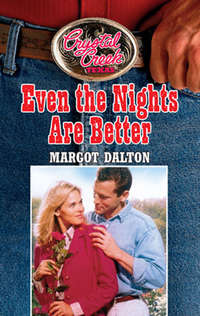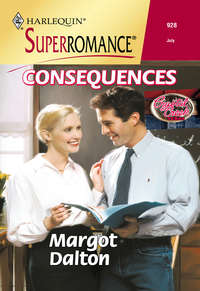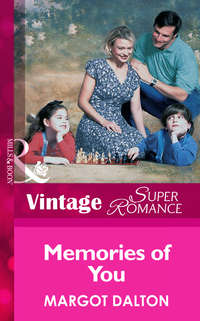
Полная версия
A Family Likeness
“Gina,” she said automatically, settling on the ledge a couple of feet away from him. “We’re all on a first-name basis here.”
“Gina,” he repeated. “And I’m Alex.”
He extended his hand. She shook it, pleased by the strength of his grip.
“It’s nice to meet you, Alex,” she said formally. “I hope you’ll enjoy your stay at Edgewood Manor.”
“Yes,” he said, leaning back, his hands braced against the stone. “So do I. We could certainly use a holiday.”
He closed his eyes in the sunlight. Gina stole a glance at him, once again struck by his look of strain and weariness.
“When will you be arriving?” she asked.
“On the first of July, right at the beginning of the long weekend. I’ll book both rooms for all of July and August, but Steffi might choose to visit a school friend for the first week or two of July, so she’ll arrive later than I do.”
“I see.” Gina wondered why he didn’t say “we.” Maybe his wife would also be staying home until their daughter was ready to travel to Azure Bay. But it seemed odd that he would come by himself, ahead of his family.
“What’s the daily routine here?” he asked, bending to pet Annabel again as she huddled by their feet, nibbling one of her paws disconsolately.
“Well, there aren’t any rules. We serve breakfast at eight o’clock, and Mary leaves fruit and baked goods in the dining room all day for guests who like to nibble. Tea is set out in the library from about four o’clock on. Guests are welcome to build a fire in the drawing room or the library on chilly nights and go anywhere on the property that’s not marked exclusively for staff.”
“How large a staff do you have?”
“Mostly just Mary and Roger and me. But in July and August, our busiest months, I also hire a couple of college girls from town to help out.”
“What about the evening meal?” Alex asked.
“The staff eats here, but we don’t serve anything to the guests. They usually choose to walk or drive into town for dinner. It’s less than half a mile, and there are several restaurants catering to tourists, including a really good seafood place. They also have a Chinese restaurant and a pizza place that both deliver, if you prefer to stay and eat at the hotel.”
“Sounds great.” He glanced up at the vine-covered facade of the old mansion’s other wing. “Can we see the room where you were working from here?”
Gina pointed. “The gold room’s that second-floor balcony up there under the dormer.”
Alex squinted into the sunlight. “Ah, yes. Would there be an electrical outlet on the balcony?”
“No, but there’s an outlet just inside the door. I particularly remember,” she added, “because I had to take the plate off today to paper around it.”
“Good. I’ll probably work out there most days if the weather’s nice.”
“What kind of work?” Gina asked.
“Computer,” he said briefly.
She nodded, not pressing for further details. He seemed reluctant to divulge more.
But then to her surprise he said, “I teach economics at a private college near Vancouver. I plan to do some writing this summer.”
“Will your wife and daughter be able to amuse themselves all day?” she asked. “I’m afraid there’s not a lot going on in the town of Azure Bay—though Kelowna is less than half an hour away, and it’s a good-size resort city.”
“Steffi’s an outdoor girl,” Alex said. “She loves hiking and swimming, and she’s a pretty fair amateur photographer. She’s not the type to hang around malls or video arcades.”
“I see.” Gina paused, thinking about the reality of a two-month stay at Edgewood Manor for anyone unaccustomed to this kind of rural existence. “How about your wife? Is she—”
“My wife is dead,” he said quietly.
“I’m sorry.” Gina glanced at him. He was staring across the lake, his profile cold and unrevealing. “I thought…I was sure you spoke of this holiday as her idea.”
“In a way it was.” He continued to look at the shimmering expanse of blue-green water. “My wife died three months ago after a lengthy illness. When I was going through her papers, I found the brochure about Edgewood Manor.”
“I see.”
“My wife was the one who planned our vacations,” he went on. “I was always too busy to bother with details like that. Besides, she had a flair for finding the perfect place and organizing quirky off-beat holidays that were perfect for us. So when I found that brochure in her desk, I looked on it as a sort of message from her.” He gave Gina a tired smile. “And it seems she was right again.”
“I hope so,” Gina said with gentle sincerity. “I hope you and your daughter enjoy the summer.”
“It’s been hard for Steffi,” he said. “Really hard. I’m worried about her.”
Gina was silent, recognizing his difficulty with talking about his family’s trauma. He was a man who didn’t share his feelings easily.
“She’s at an age where a girl needs her mother,” he went on in a low voice. “It was bad enough for Steffi to lose her, but to watch how terribly Janice suffered at the end…”
He fell silent.
Gina glanced at him again, wanting to reach over and squeeze his hand, or put her arm around him and give him a sympathetic hug. But she kept her hands folded tightly in her lap.
“What…what was your wife’s illness?” she inquired hesitantly. She knew she was prying, but something about the man compelled her to ask.
“She had Huntington’s,” he said, still staring at the lake.
“Oh,” Gina murmured, wrung with sympathy. “Oh, I’m so sorry.”
She was silent a moment, trying to remember what she’d heard about the condition. “I always thought…” she began.
He turned to face her. “Yes?”
“About Huntington’s. I thought it didn’t affect people until quite late in life.”
“Usually it doesn’t,” Alex said. “But it can strike in the early thirties. That’s when my wife first started to develop symptoms—about ten or eleven years ago. Her father and an uncle both died of it,” he added, “so we knew what to expect. But the children of people with Huntington’s still have a fifty percent chance of escaping it.”
“And until the symptoms appear…”
“You keep hoping,” he said bitterly. “You cling to hope until the last minute. You tell yourself maybe the tremors are just fatigue, and the dizziness is some kind of allergy. You grasp at straws as long as you can.”
“But hasn’t a test been developed recently? I thought there was some kind of genetic marker that can be isolated and identified.”
“That’s true,” he said, looking at Gina in surprise. “You’re very well-informed.”
“I watch public television,” she said, “and read a lot. I’ve always had an interest in scientific things.”
“Of course you have,” he said with a quick smile. “Anybody can tell that by looking at the things you carry in your pockets.”
She smiled back. “My mother was a chemistry teacher until she retired a few years ago. She always encouraged me to have an inquiring mind.”
“What about your father?”
Gina tensed, reluctant to get into a personal discussion. But he’d told her about his own family tragedy, so it seemed graceless not to respond to his questions.
“My father was in sales,” she said. “He traveled a lot. When I was about eleven, he left on a trip to Ontario and wound up staying there. My mother raised us all alone.”
“Us?”
“I have a sister who’s ten years younger than I am. She and my mother live in New Brunswick. I came out here almost twenty years ago to go to college, fell in love with the province and never left.”
“Why did you decide to go to school so far from home?”
“I have an aunt who lives in Vancouver near the university,” Gina said. “It was cheaper to stay with her than in a dormitory somewhere. And UBC offered a really good course on hotel management, which was always my career choice.”
“I see.”
Alex leaned back again, lifting his face gratefully to the warm rays of sunlight.
“In answer to your question about testing,” he said after a brief silence, “it was something my wife never wanted to do, even after the test became more readily available. She said she refused to live with a death penalty over her head. As it happened, the disease progressed a lot more rapidly than is usual once the symptoms appeared, so maybe she was wise.”
Maybe, Gina thought. But it wouldn’t have been her own choice. She always preferred to know what she was dealing with, to confront the reality head-on no matter how awful it might be. She wondered about Alex’s daughter, though. Had she been tested? Surely—
Alex suddenly got to his feet, then waited courteously while she did likewise. “We’d better get this deal concluded,” he said. “I have to be back in Vancouver before nightfall.”
She walked with him back into the hotel, relieved that their painful conversation was ended.
But as they strolled through the hallway with Annabel at their heels and paused in the kitchen to greet Mary, Gina was alarmed to realize she was already counting the days until the first of July…
CHAPTER THREE
ROGER STROLLED into the kitchen and patted Gina’s shoulder as she worked at a little side table near the window.
Outside, the late-evening sun was setting behind the mountains, casting long purple shadows across the yard. The lake glistened with fiery streaks of orange, and the twilight air was warm and murmurous with crickets and the music of bullfrogs by the water’s edge.
“What’s this one?” he asked.
Gina squinted at the scrap of wire and golden feathers in her vise. “A yellow nymph,” she said. “Like the ones I made last year, but with some minor improvements.”
“Those yellow nymphs were great flies. Remember the big trout I caught, Gina?”
“How could I forget? You’ve mentioned it practically every day for the last year.”
“You’re just jealous,” he said placidly. “We should try to get up to Bear Creek again. We’ve hardly been fishing at all this spring, and June’s almost over.”
Gina sighed, winding her thread carefully. “It’s always so busy around here.”
“Well,” Roger said, pouring himself a cup of coffee from the pot on the counter, “if we wait till we’re not busy, we’ll never go.”
“That’s certainly true.” Gina frowned at the partly shaped fishing fly on her vise, then rummaged in a tackle box full of colored feathers, scraps of fur and spools of thread. “I think I’m going to add some black antennae,” she said. “Something that wobbles a bit.”
“Do nymphs have antennae?” Roger asked.
He crossed the room to the big oak table, the antique lights overhead reflecting on his bald pate with its scant fringe of silver.
“Who cares?” Gina said cheerfully. “Never question an artist. I’m the one who tied the fly that caught your prizewinning trout, remember?”
Roger sat at the table, stirring cream into his coffee. “I remember, all right. Speaking of being busy,” he said thoughtfully, “when do Mr. Colton and his daughter arrive?”
“Next week. At least, that’s when the rooms are booked, but he’s going to be arriving on his own. He faxed a confirmation last week. I gather she’s going to be coming a week or two later.”
“It seems strange,” Roger said. “I mean, booking the patio room just to have it available, even though the girl won’t be here for maybe two weeks. At a cost of more than a hundred dollars a day, too. Isn’t that a real waste of money?”
“It appears,” Gina said, “that money isn’t a problem for Mr. Alex Colton.”
“I didn’t think college professors made that kind of income.”
“Neither did I. But, you know, he seemed so casual about the cost. He was perfectly willing to accept my terms. In fact, I could probably have charged him twice as much and he would have agreed without an argument.”
Roger sipped his coffee and looked out the window at the glowing sunset colors reflected in the waters of the lake. “Well, it’s sure an advantage to have those rooms booked full-time. No turnover. Less work for you.”
“Maybe.” Gina snipped at the colored thread. “And maybe not.”
Roger glanced at her in surprise. “What do you mean?”
Gina selected a bit of black wire, wrinkling her brow thoughtfully. “What if they’re awful guests?” she asked. “What if we find after a while that we can’t stand them, like that Kimmer family last summer, but we’re stuck with them for two whole months?”
Roger grinned. “Remember how Mrs. Kimmer demanded a computer printout of the fat and cholesterol content in every breakfast?”
“And Mr. Kimmer kicked Annabel, and he and Mary almost came to blows over it?”
“And—” Roger grimaced “—the way they kept letting those awful kids of theirs slide down the banisters all the way from the attic, and take their towels outside to play in the mud.”
“Oh, they were a charming group, all right,” Gina said dryly. “That’s my point.” She put the wire down and turned to look at her caretaker. “What if these two are horrible like the Kimmers and turn out to be really disruptive? We’ve never had somebody here for two whole months, Roger.”
“I’m not worried,” he said calmly. “I met Alex Colton and had a talk with him that day he booked the rooms. He struck me as a decent sort of fellow. I liked him.”
Gina was silent, idly flexing her pliers.
“His daughter sounded nice, too,” Roger went on. “In fact, Colton told me she’s a real outdoors type. I was wondering,” he added almost shyly, “if maybe she’d want to go fishing with us sometime. Wouldn’t it be fun to have a kid along, Gina? Somebody young and enthusiastic?”
Gina considered this, startled by the idea. “I’m not sure,” she said at last. “I don’t know much about teenage girls.”
“Didn’t you grow up with a little sister?”
“Sure,” Gina said. “But Claudia’s ten years younger than I am, Roger. She was eight when I left home, and I’ve hardly seen her at all since. It’s too expensive to travel between here and the Maritimes.”
“How long ago was it that time she came out here? Five or six years ago?”
Gina considered. “It would have been eight years, I guess. That trip was my gift to Claudia the year she graduated from high school, when she was eighteen. My goodness—” Gina sighed “—I can’t get over the way the years fly past.”
“Does she still have that trouble with her leg?”
“Not much. She hardly limps at all anymore.” Gina turned to stare out the window. “But it’s taken years of hard work and therapy.”
“What happened exactly?” Roger asked. “I don’t think you ever told me the whole story, just that she’d been in some kind of an accident.”
“It was after I’d been out West a couple of years, when Claudia was ten. I was in Vancouver when I heard.” Gina shuddered. “My mother decided to take Claudia with her for a summer holiday in New England. She’d been driving all day and was exhausted, but I guess she didn’t realize how exhausted. She dozed off on the freeway in Maine and drove under a semitrailer parked by an off-ramp.”
Roger took another sip of his coffee and listened in sympathy.
“It was so awful,” Gina went on. “Mom’s injuries were mostly superficial, but Claudia’s right leg was almost severed just above the knee. They rushed her to the hospital and used all kinds of microsurgery techniques to reattach the nerves and tendons, then did bone grafts to restructure the leg.”
“Wonderful, isn’t it?” Roger said. “What they can do with medical science these days.”
“Oh, it’s wonderful, all right,” Gina said gloomily. “Really wonderful.”
“Gina?” he asked, puzzled.
She met Roger’s gaze, thinking about the nightmare her family had been forced to endure. “My mother’s kind of an absentminded professor, Roger. Not practical at all. She didn’t think to buy medical insurance for herself or Claudia before traveling out of the country.”
His eyes widened. “My God,” he breathed. “So how much did a procedure like that cost?”
Gina brushed a hand across her forehead. “Some of the surgeons donated their time, and we had Claudia transferred back to the Maritimes as soon as she could travel. But the bill for her treatment was already over forty thousand dollars by the time she was moved.”
“Could your mother afford that?”
“My mother could hardly afford to put meals on the table,” Gina said bleakly. “She was about to lose her little house, her teaching job, and any possibility of earning enough in the future to pay for the years of extended therapy that Claudia was going to need.”
“So what did you do?”
“We managed.” Gina stared at the lake. The sun had completely retreated behind the mountains now, and the black still depths of the lake seemed to echo the void in her heart, the aching sorrow and yearning that never went away. “We managed somehow. We all made some…pretty big sacrifices.”
Roger studied her thoughtfully for a moment. “Your sister is a real stunner, as I recall,” he said at last.
“She certainly is.” Gina gathered herself together. “Claudia looks a lot like our mother. I wasn’t lucky enough to get the red hair or the peaches-and-cream complexion.”
“Well, you’re a beauty in your own way, Gina,” he said gallantly. “Red hair or not.”
She smiled at him. “And you’re a sweetie. But I’m realistic about myself, Roger. I know what my strengths and weaknesses are.”
“I’m not sure you do. I don’t know if you’ve ever been fully aware of your strengths.”
Gina shook her bead. She and Roger had been friends for almost twelve years, but except for some casual teasing, they usually tended to avoid this kind of personal discussion.
“Speaking of strengths and weaknesses,” she said, removing the completed fly from her vise and picking up another bit of wire, “do you ever regret moving .here, Roger? Do you miss having a desk and an expense account and a brass nameplate on your door?”
“Not a bit. I live alone, and I’m sixty-two years old. Why would I want to sit behind a desk all day? I want to enjoy my days, because if I can’t, what’s the sense in living?”
“But do you really enjoy it here?” she asked, suddenly anxious to hear his answer. “I mean, looking after the hotel for me and keeping things running smoothly, is that enough of a challenge for you?”
“At my age, I don’t want challenges anymore, Gina. What I want is comfort. And I find my life here very comfortable.”
“Good,” she said in relief. “Sometimes I’m afraid you’re getting restless.”
“You’re supposed to quit saying things like that,” he reminded her, then pushed his chair back and got up to open a cupboard door. “What happened to the banana loaf Mary baked this morning?”
“The guests gobbled every last crumb with afternoon tea.”
“Too bad,” he muttered, still peering moodily into the cupboard. “Where is the woman, anyhow?”
“She’s at choir practice. You’ll get as fat as Annabel if you keep eating Mary’s baking,” Gina warned him, though from the look of his long angular body she doubted there was much fear of that.
She paused suddenly and narrowed her eyes. There was something different about Roger tonight.
“Why are you here now?” she asked. “You don’t usually come over after supper.”
“I needed to pick up something.”
“What?”
“Just some tools,” he said evasively.
“Why?” Gina asked.
“I’m working on something.”
“But you don’t even have a workbench at your house, do you? I thought you did all your woodwork here at the hotel.”
“What is this?” Roger asked mildly. “An inquisition? Am I not free to drop by the hotel after hours if I want to?”
“Of course you are,” Gina said. “But you look…different tonight, that’s all.”
“In what way?”
“I don’t know.” She studied him. “Maybe you’ve changed your hairstyle.”
He chuckled. “And you, young lady, are becoming far too impertinent.”
Gina smiled and returned to her task, while Roger poured himself a second cup of coffee. For a while there was a companionable silence in the kitchen.
But after a few minutes the peace was broken by the closing of a door, a noisy storm of barking and a gentle tread in the hallway. Mary entered the room, laden with books. Annabel tumbled at her heels and yelped hysterically.
“For God’s sake,” Roger said. “Feed that animal, won’t you? She’s being even more annoying than usual.”
Mary lowered her books onto the table and gave him a level stare. Then she sniffed dismissively and turned away. Gina smiled to herself.
“How was your choir practice, Mary?” she asked.
“It was exciting.” Mary crossed the kitchen and took a can of dog food from the cupboard. She opened it and measured the contents into a bowl with calm deliberation, while Annabel writhed on the hardwood floor in an agony of anticipation.
“Choir practice was exciting?” Roger asked.
Mary washed her hands at the sink and continued to address Gina as if he hadn’t spoken. “Mr. Bedlow gave the soprano solo to Marianna Turner.”
Gina’s eyes widened. “No kidding. Even though everybody knows?”
“What does everybody know?” Roger asked, watching with a bemused expression as Mary put Annabel’s bowl on the floor and the animal began to wolf it down as if she hadn’t eaten in weeks.
“About Mr. Bedlow and Marianna Turner,” Gina explained.
“What about them?”
“Oh, Roger,” Gina said. “How could you have possibly missed such a juicy tidbit of gossip?”
His look of surprise was almost comical. “Dried-up old Cecil Bedlow? And that plump young schoolteacher? There’s gossip about those two?”
Mary forgot she was no longer on speaking terms with the caretaker. “There certainly is,” she told him, tying on her apron, then began opening doors and cabinets, assembling the ingredients to prepare batter for the next morning’s fruit crepes.
“Was Marianna embarrassed?” Gina asked.
“I think so. Whatever’s happening, it’s more on his side than hers, in my opinion. I think poor Marianna just doesn’t know what to do about him.”
“You’re always so generous, Mary,” Roger said. “Other women would probably be catty about a situation like that.”
Mary ignored the compliment. “So we didn’t get much of anything else done,” she concluded, “except for the opening bars of the ‘Hallelujah Chorus.’ We’re singing it at the Canada Day picnic next weekend.”
“Well, of course,” Roger said solemnly. “That’s a rousing picnic song. Handel should blend right in with the fried chicken and the kids’ sack races.”
Mary gave him a stern glance. “Well, that’s good. Because your chamber-music group is booked to do four sets of Elizabethan madrigals on the entertainment stage by the hamburger tent.”
“Elizabethan madrigals!” he exclaimed, recoiling in alarm. “You’re joking.”
“It’s right there on the program, next to the Tiny Tots Highland Dancing.”
Roger subsided behind his coffee mug again. “This town is a mad, mad place,” he said sadly. “Utterly insane.”
“Oh, come on,” Gina said. She left the worktable to get herself a mug of coffee, pausing on the way to drop a kiss on the top of Roger’s shiny bald head. “You love living here. And you have lots of fun at the picnic every year, no matter how much you complain and make fun.”
“My goodness.” Mary paused with a sifter of flour in her hand. “I almost forgot,” she said, staring at Gina. “The choir practice wasn’t the only exciting thing this afternoon.”
Gina carried her mug back to her table and began construction of another yellow nymph. “So what else happened, Mary?”
“I got some library books.”
“How does the woman ever survive her days?” Roger asked with a grin. “Fraught as they are with such drama and excitement.” He rolled his eyes eloquently in Gina’s direction, making her giggle. Unruffled by his teasing, Mary began to mix the batter for her crepes in a big blue enamel bowl.
“I went to the library,” she repeated, “and picked out a lot of books for myself. I also got some new books on gardening and furniture restoration for you, Gina, in case you ever have time to read.”










